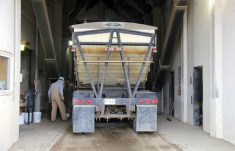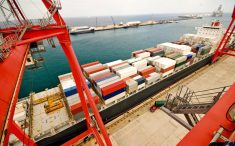The nature of eastern Canadian grain logistics, and a strike by St. Lawrence Seaway workers who operate the system’s canals, will see cascading impacts across the system if the situation isn’t resolved quickly, according to Crosby Devitt, CEO of Grain Farmers of Ontario.
Unifor workers in both Ontario and Quebec walked off the job Sunday following a breakdown in talks between the union and the system operator, St. Lawrence Seaway Management Corp (SLSMC).
Read Also

Prairie CWRS bids rise, other wheats mixed
Canada Western Red Spring (CWRS) wheat bids across the Prairie provinces saw some strength during the week ended Nov. 11, taking some direction from the United States futures. However, other wheat classes were mixed.
Negotiations with a federal mediator are slated to resume on Friday, but Devitt said there is little time to spare because the longer the seaway is closed, the bigger impact the strike will have.
“What we’re doing is calling on government and the parties involved to get this strike over as soon as possible.”
Devitt said storage capacity in southwestern Ontario, which is home to the province’s grain and soybean production, is limited because of the close proximity to port access. The strike is occurring at a particularity critical point in the harvest, he added.
“We’re in the last third of soybean harvest, and corn is just getting started in Ontario. It’s been a late start for the growing season and wet weather these last few weeks. We’ve got a huge amount of corn and soybeans that are either in the field or need to get to market,” he said.
“We rely on boats moving out the St. Lawrence around the world at harvest in Ontario.”
Port terminals in southwestern Ontario are filling up and deliveries are starting to be restricted.
Storage capacity is currently being used for soybeans, which means corn can’t be harvested and stored, Devitt said.
“If we don’t free up that room in the countryside from beans, we’re not going to have room for corn,” he said.
The strike’s impacts could reach beyond southwestern Ontario if it continues. The seaway usually closes during freeze-up in January, and the backlog could hit western grain shipments coming out of Thunder Bay if a resolution isn’t found before the New Year, he added.
The Canada Labour Code requires workers to continue serving bulk grain vessels at ports in the event of a strike or lockout, as was the case during the longshore workers’ strike at West Coast ports this summer.
The SLSMC has sought a ruling from the Canada Industrial Relations Board (CIRB) on whether that Labour Code rule applies to seaway workers in this case.
SLSMC vice-president Jean Aubry-Morin said via email Tuesday that no deadline has yet been announced for the CIRB to rule on the matter.
— Alex McCuaig reports for the Western Producer from Medicine Hat, Alta. Includes files from Dave Bedard of AGCanada.com.













